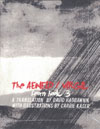This is the oddly formal, musical phrase that Mr. Hilditch utters towards the end of William Trevor‘s novel Felicia’s Journey. It’s the first interesting, original thing he’s said, and perhaps the most honest — his speech up till now has been filled with empty platitudes and shopworn phrases like “beggars and choosers,” “know the score,” and his favorite, “find out the state of play,” an expression he uses to indicate looking into a situation, as he promises to do for Felicia in her search for her boyfriend.
Hilditch’s whole life has been a lie. More than that — or precisely that, but in a way particular to language, his use of language to constantly avoid the truth. His empty expressions mask not only his real intentions but also his genuine mood, which is often dark as opposed to the self-deprecating cheer of his words. A stilted formality creeps in during intense moments, as when he’s trying to convince Felicia to have an abortion. But it’s still borrowed language, official language: “The point I’m making to you is that a situation like you and Johnny are in can all too easily be affected by misfortune.” A touch of this formality is preserved when Hilditch finally cracks, accompanied by the weirdly poetic phrasing, as if he’s a tea kettle that couldn’t help piping his madness at just this pitch.
I remember the concern with language in this book from having read it last summer in Ireland, and a recent visit from a friend brought the novel back to mind as a last-minute summer diversion before school starts up again.
It’s worth expanding on a quote I extracted earlier from Foucault’s preface to History of Madness:
-
…modern man no longer communicates with the madman: on the one hand is the man of reason, who delegates madness to the doctor, thereby authorizing no relation other than through the abstract universality of illness; and on the other is the man of madness, who only communicates with the other through the intermediary of a reason that is no less abstract, which is order, physical and moral constraint, the anonymous pressure of the group, the demand for conformity. There is no common language: or rather, it no longer exists; the constitution of madness as mental illness, at the end of the eighteenth century, bears witness to a rupture in dialogue, gives the separation as already enacted, and expels from memory all those imperfect words, of no fixed syntax, spoken falteringly, in which the exchange between madness and reason was carried out.
(emphasis mine)
Foucault seems to be referring here to a pre-clinical approach to madness, a time when madness had not yet reached the point of abjection at which it could only be talked about, not with. All of the technical terms around madness as “illness” etc. had not yet been coined, and unreason could carry out a dialogue with reason — as it did in the writings of Erasmus, the paintings of Goya, and so on. That language seems to have been made of simple words, perhaps used in intuitive and surprising ways. Foucault indicates this when he later writes that one of his aims for his book is to find
- … a language that was quite neutral (fairly free from scientific terminology, and social or moral options), in order to approach most closely these primitively tangled words, and so that that distance through which modern man shores himself up against madness might be abolished…
What does this have to do with Trevor’s novel? Nothing, at least directly. The novel is not so much about an inability to communicate with a madman, as a madman’s inability to communicate at all, and perhaps everyone’s inability to communicate with each other. Not only is Felicia, as an Irish girl, the victim of a “suppression of language, religion and human freedom” according to her father, but she’s doubly so when trying to operate in the backwoods and suburbs of England in search of her beau, unable to understand what people are saying to her and no doubt misunderstood herself.
Miss Calligary, the Jamaican street evangelist to whom Mr. Hilditch makes his strange pronouncement, soon to be followed by a confession, is his linguistic counterpart. When not speaking in religious platitudes almost as meaningless as his empty clichés, she uses a stilted approximation of official, formal speech. When Hilditch cracks and begins telling her about his mistreatment of Felicia, it’s Miss Calligary’s waifish sidekick, a troubled young woman like Felicia, who understands and says to herself “Here is a madman.” Miss Calligary, while recognizing something is off about him, can only conclude that “this man is not as he seems” and offer more empty promises of bringing him peace of mind through prayer and “gathering.”
Foucault dreams of a language in which “reasonable man” can re-enter a dialogue with madness that seems to have been lost in the corridors of confinement and the modern clinic. Mr. Hilditch’s strange poetic phrase is such language, though no one but another lost young woman is there to recognize it for what it is, and aside from her “greater excitement” she is unable to respond. He does not continue along these powerful and emotional lines, and his words don’t seem to do him or anyone else any good. The idea of disconnect and “rupture” certainly fits here, as it does for our cultural and political landscape as a whole. No one understands what anyone else is saying. No one’s listening.
Madness has lost the ability to speak. The language Foucault dreams of is impossible.
Or..?


















now i have to reread the book. great.
I have an unexplainable urge for fried chicken.
I wish the essays from this summer’s group had contained these sorts of insights.
well, i’ve had a lot of time to think about it. re-reading helped, too.
welcome back!